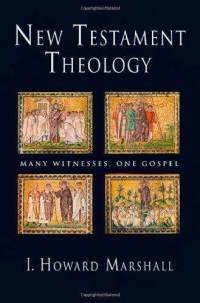 I. Howard Marshall's chapter on Galatians in terms of Dogmas, Doctrines, Distinctives, and Details.* Dogmas. Paul's reason for writing the letter to the Galatians deals with the very heart of the Gospel and thus most of the concepts fall under Dogma. Marshall clearly articulates the Gospel presented in the letter as how “a person could be put right with God or enter into a right relationship with him or be counted as 'righteous' only through believing in Jesus Christ and not by observance of the Jewish law” (215). Furthermore, Marshall promotes that there was one solid understanding of the Gospel as shared by all the Apostles and dismisses theories by Baur that Paul and Peter were rivals with a different understanding of the Gospel (215). He also affirms Paul's separate divine calling that was approved by the Apostles and the church in Jerusalem as a historical event, therefore in acceptance of Christ's theology (214). Hence, it is right to see the purpose of the Law not as an alternative way of life or means of salvation, but “to lead people to Christ by making them realize that they were sinners” (218). All in all, Marshall affirms the correct response to the Gospel as an apostolic faith being both “salvation-historical” and “salvation-receptive” (220). It is interesting to hear his explanation of the Gospel as being too great to be reduced to a single motif, in that both justification through the cross and the promise of the Spirit to overcome the flesh (221) are included to mean both a new relationship and the power of transformation. Whether these are two sides of the same coin or stages in Sanctification could use further development/clarification. Marshall dismisses the modern interpretation based upon poor exegesis that mankind is saved by Christ's faithfulness (vs. faith in Christ) which would lead to Universalism (225). Doctrines. Marshall does an expert job outlining the controversy in Galatians including possible motivations for the Judaizers (210-213). The evidence of Christian salvation is the experience of receiving the Spirit, which occurs before any “act” on behalf of the believer (216). He also accurately captures that freedom in Christ is not freedom to sin but deliverance from the requirements of the law and the power of sin in order to “keep the fundamental commandment, which is to love” (219). He further clarifies that believers are not helplessly caught between two opposing spiritual forces, but must actively struggle to overcome under the power of the Spirit (219). This seems to go hand-in-hand with Paul's two tier truth: correct understanding of the gospel and correct behavior as a result (221). Marshall seems to affirm the vicarious penal substitutionary atonement of Christ on the Cross and subsequent imputation of His righteousness even though it is never explicitly expressed (222-223). Marshall brings up an interesting question that could have used more clarity about the meaning of his term “salvation-proclamatory” in lieu of “existential” to avoid a false contrast with “salvation-historical” (220). Marshall seems to take the traditional view in contrast to the “New Perspective” on Paul and “Covenantal Nomism” (228) in that the Jews are also sinners in need of the salvation (229). Distinctives. Paul's understanding of righteousness during the period of the law, whether a looking forward faith in Christ or the sacrificial system (and its scope to cover unwitting vs. deliberate disobedience) (231) can be debated. The same goes for the role of the Law for Christians since: some hold that it was fulfilled by Christ and others hold that the Law has no continuing validity for believers, (which, Marshall disregards this idea in light of Romans). Either way, the whole Law can be summed up as ways to express Loving God and your neighbor as yourself (232). Marshall makes other distinctive statements including: “the church is understood as the new Israel of God,” which reflects his Covenant views (227); the Spirit is sent in response to faith, vs. the Reformed concept that faith is the result of God sending the Spirit (233); and faith is expressed via Baptism (not Baptismal Regeneration) (233). Details. Marshall's view of the crucifixion of the believer including temptation needs explanation(234).
*Dogmas are theories directly impacting God's mission to reconcile all people to Himself (orthodoxy & orthopraxy required).
Doctrines indirectly impact God's mission (and are thus vitally important), but people can fail to interact with or understand them accurately (essential to orthodoxy, not orthopraxy). Distinctives don't affect the orthopraxy of salvation, but will impact the orthopraxy of a church. Details have little to no effect on orthodoxy or orthopraxy.
0 Comments
Leave a Reply. |
AuthorBrett Yardley: Categories
All
Archives
January 2019
|

